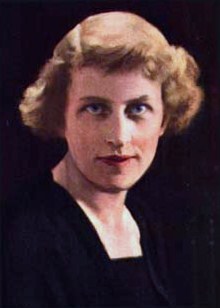 Winifred Holtby (23 June 1898 - 29 September 1935) was an English novelist and journalist, best known for her novel South Riding about a Yorkshire community struggling with the Depression of the 1930s. She was born in Rudston in 1898, the daughter of David and Alice Holtby.
Winifred Holtby (23 June 1898 - 29 September 1935) was an English novelist and journalist, best known for her novel South Riding about a Yorkshire community struggling with the Depression of the 1930s. She was born in Rudston in 1898, the daughter of David and Alice Holtby.
She joined the Women's Army Auxiliary Corps towards the end of World War I and later studied at Somerville College, Oxford, where she met future author Vera Brittain. Brittain's memoir "Testament of Youth" (1933) chronicles the start of their friendship. Moving to London with Brittain in 1921, Holtby soon established herself as a leading journalist and by the age of 28 was on the board of directors for the influential weekly journal "Time and Tide." In 1931 she was diagnosed with chronic nephritis (invariably fatal at that time). Her death at 37 came just as she was gaining recognition for her literary efforts. Holtby is buried at All Saints Churchyard in Rudston. In all she wrote 14 books, including six novels; two volumes of short stories; the first critical study of Virginia Woolf (1932); and "Women and a Changing Civilization" (1934), a feminist survey with opinions that are still relevant today. But she is chiefly remembered for her long Yorkshire novel "South Riding", and life in rudston is considered to be a basis of the novel. From 1967 to 2003, England's Royal Society of Literature awarded the Winifred Holtby Memorial Prize for "Best Regional Novel."
The family home was Rudston House, is still a working farm and a private residence, but the gardens are open to the public once a year in July as part of the National Gardens scheme. The gardens are 3 acres in size with fine old trees, lawns, paths with clipped box hedges, conifers, shrubs, greenhouses, roses, and short woodland walk, with pond. There are plenty of seats and interesting corners and features.
Further information can be found in these places: